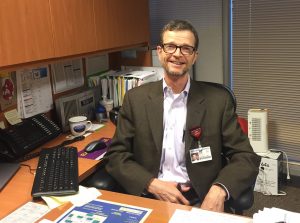
Respiratory care requires lifelong learning. But given their busy professional and personal lives, many RTs never find the time to invest in educational advancement or the acquisition of additional credentials.
That’s where a proactive manager can really make a difference. Tom Berlin, DHSc, MSc, RRT, is director of pulmonary and respiratory care at Florida Hospital Orlando, an acute care tertiary facility with 215 RTs on staff. He explains how he has made lifelong learning a priority in his department.

Three advantages
“Active pursuit of professional development of your team has three primary advantages,” Dr. Berlin said. “First, preparation for specialty credentialing and degree attainment expands the knowledge base and critical thinking skills, both of which benefit clinical practice and communication. Second, it provides a basis for advancement into the next level of clinical practice, an educator role, or management. Third, and perhaps most importantly, it demonstrates respect as well as passion for the success of individual team members.”
One of the strategic goals for his department aligns with the AARC’s goal to have 80 percent of RTs either have, or be working toward, a bachelor’s degree by 2020. Florida Hospital Orlando offers tuition assistance to employees and Dr. Berlin actively supports approval of applications for any staff who want to take advantage of it. He keeps track of staff progress on degree attainment and reports percentages of completion among those attending school.
Staff who are making the effort to continue their education receive plenty of kudos as well.
“Individual achievement must also be recognized and celebrated,” Dr. Berlin said.
Right now he says 39 percent of his RTs have achieved a bachelor’s degree and 11 hold graduate degrees. About 10 percent of his staff hold specialty credentials.
He believes these career development activities foster professionalism in the department and advance the stature of RTs throughout his organization.
Sense of ownership
It all spills over onto patient care too.
“I strongly believe that practitioners who feel they are loved, nurtured, and treated with respect develop a strong sense of ownership and belonging,” Dr. Berlin said. “That sense of pride and satisfaction is translated to the patient, who in turn feels truly cared for.”
Professional engagement does wonders for staff turnover as well. Dr. Berlin says his current separation rate is only around two percent, which makes it significantly easier for him to demonstrate positive performance outcomes.





